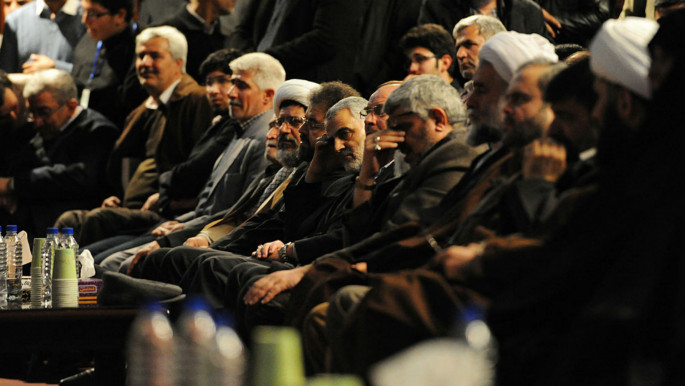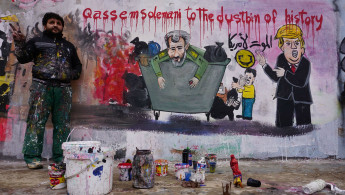'Nobody resembles him but Assad': Syrians celebrate death of Soleimani
'Nobody resembles him but Assad': Syrians celebrate death of Soleimani
In much of Syria – where millions have suffered under the Iran-backed regime of Bashar al-Assad – the general's death was welcome news.
4 min read
Aziz Asmar poses next to his mural in the town of Binnish in Idlib [Getty]
As massive crowds turned out in Iran to mourn Qasem Soleimani, celebrations over the Iranian general's sudden death erupted across opposition-held Syria.
"Qasem Soleimani is a criminal. Nobody resembles him but Bashar al-Assad," said Ahmed Al-Mustafa, a pharmacist in Idlib.
In an operation US President Donald Trump says was aimed at deterring future attacks on Americans, an overnight US airstrike in Baghdad killed Soleimani and several senior members of an Iran-backed Iraqi militia on Friday.
When he heard the news, al-Mustafa and his friends dropped what they were doing and spent the day handing out candy and baked goods to strangers as their way of celebrating.
"It was one of the most beautiful days of the past nine years," he said. "Everyone was extremely cheerful."
In the days since Soleimani's assassination, Iran's leaders, including Supreme Leader Ayatollah Ali Khameni, have vowed revenge on the US.
Meanwhile, Iraq's caretaker Prime Minister Adel Abdul Mahdi has warned the attack, which took place on Iraq's soil, was a "massive breach" of his country's sovereignty.
 |
|
| Read also: Syria Weekly: Syrians remember Soleimani with fear and loathing |
But in much of Syria – where millions have suffered under the Iran-backed regime of Bashar al-Assad – the general's death was welcome news. Street celebrations broke out Friday in Idlib province, the country's last stretch of rebel-held territory.
"I'm so happy," said Suad, a university student living in a camp for displaced Syrians near the Turkish border.
"Send my regards to Trump," she said. "He should have done it a long time ago."
The architect of Iran's growing footprint in the Middle East and head of the country's elite Quds Force, Soleimani helped shore up support for Syria's embattled dictator Bashar al-Assad and sent legions of foreign fighters to back the president's troops during the early days of the war.
During a secret visit to Moscow in 2015, it was Soleimani who reportedly convinced Russian President Vladimir Putin to provide airpower to the Syrian regime, which ultimately helped turn the tide of the war in Assad's favour.
"Under the pretext of defeating terrorists, Soleimani and his men imposed a suffocating siege on us. We could not resist," said Zaed Jamal, who spent four years under siege and bombardment in the Damascus suburb of Daraya.
 |
Under the pretext of defeating terrorists, Soleimani and his men imposed a suffocating siege on us. We could not resist |  |
Now in Idlib with his family, Jamal says he doesn't expect Soleimani's death to change the outcome of the war, although it may slow Assad's progress on the ground.
"Hopefully during this time the Syrian people will breathe a little," he said.
After nearly nine years of war, Assad and his allied forces hold more than two-thirds of the country. Idlib province, the northwestern enclave bordering Turkey, is the last major pocket of territory still in the hands of the opposition.
In mid-December, pro-government forces stepped up their air and ground assault on the region, forcing more than 235,000 people to flee their homes, according to the United Nations. Last week, Syrian government artillery fire reportedly killed five children and four adults at a school in the town of Samin.
Omar al-Saud and his family recently fled their home in Maarat al-Numan, the largest city in Idlib's southern countryside and are now sheltering in a house they've rented near the Turkish border.
"Soleimani was a war criminal, and his militia forced me out of my house," al-Saud said. "But every criminal has an end."
Idlib is home to an estimated three million civilians, roughly half of whom were displaced from government offensives in other Syrian cities like Douma, Homs and Aleppo.
"I, like most Syrians, am glad he's dead," said Muhammed Darwish, a dentist who survived two years under siege in Madaya before fleeing to Turkey.
"Soleimani was responsible for destroying many cities of Syria. This makes [his death] personal for all Syrians," said Darwish.
Elizabeth Hagedorn is a freelance journalist focusing on migration and conflict with bylines in The Guardian, Middle East Eye and Public Radio International.
Follow her on Twitter: @ElizHagedorn



